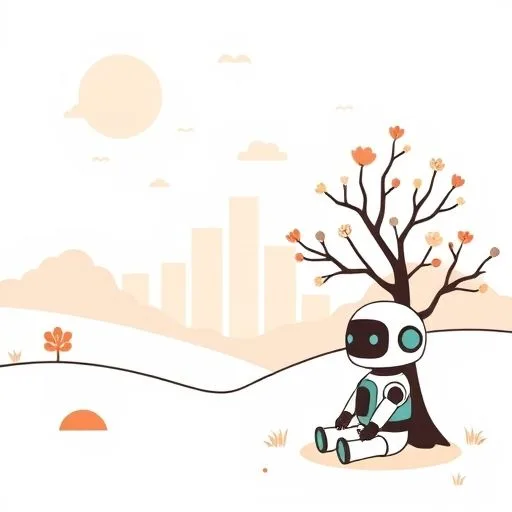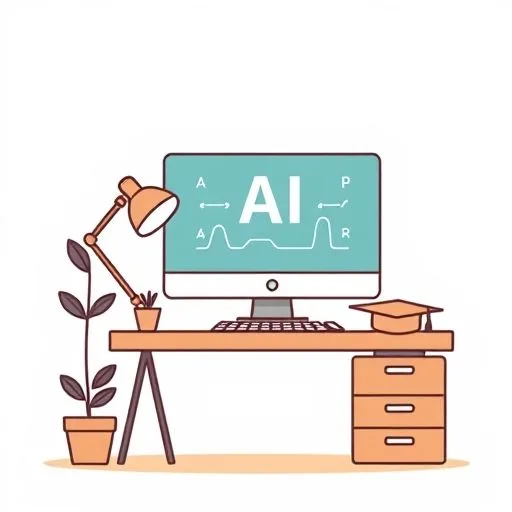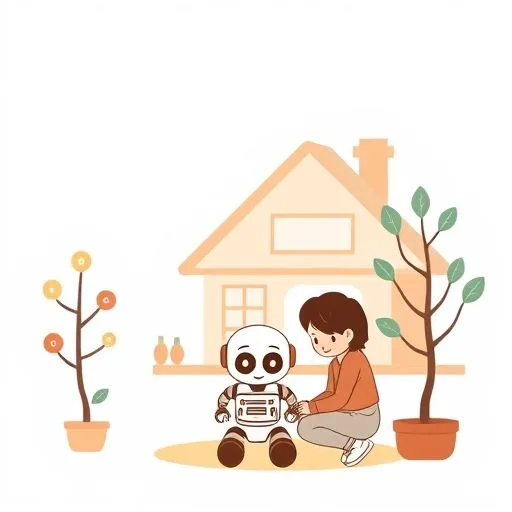
Have you ever had one of those moments where something you’ve been quietly contemplating suddenly becomes a headline? That’s exactly what happened when I saw ‘Geoffrey Hinton: Society Is Unprepared For AI’s Economic Disruption’ flashing across my news feed. As a dad watching my seven-year-old daughter discover the world with wide-eyed wonder, these warnings about artificial intelligence shaking up our future hit differently. They’re not just about abstract job losses or economic theory – they’re about the little human being I’m raising today who’ll be navigating this changing world tomorrow. Let’s explore what these seismic shifts mean for our children and how we, as parents, can help them not just survive, but thrive in the age of AI!
Is the AI Revolution Already Impacting Our Kids’ Future?

You know, it’s fascinating (and a bit scary) to realize that the AI transformation isn’t some distant future scenario. According to recent research, we’re already witnessing early signs of this disruption. A Stanford study found that AI adoption has coincided with a 16% decline in employment for young workers aged 22-25 in sectors vulnerable to automation. As a dad, seeing these stats makes me think about my daughter’s future and how we can prepare her for these changes.
Think about that – our kids are just beginning their educational journey while the entry-level jobs they might traditionally pursue are already being reshaped by technology.
You know, I’ve seen firsthand how AI can analyze patterns and make predictions that would take humans hours to calculate. It’s incredible, really! But when I think about my daughter’s future, I realize we need to prepare her for a world where routine tasks might be handled by machines. The key insight here isn’t to fear technology, but to understand how to complement it with uniquely human skills.
The McKinsey Global Institute predicts that up to 800 million jobs could be displaced by automation by 2030. That’s a staggering number! But here’s the hopeful part – the same research suggests that 375 million of these workers will need to be retrained for new roles.
This isn’t about one job disappearing and nothing replacing it; it’s about the nature of work evolving, just as it has throughout history with every major technological shift.
So, what does this mean for us as parents? We need to help our kids develop a mindset of adaptability and continuous learning – skills that will serve them no matter what the future holds.
How Can AI in Education Truly Prepare Our Children?

When we talk about AI in education, it’s easy to get caught up in either utopian dreams or dystopian fears. But the reality, as Hinton suggests, is more nuanced. The AI in education conversation shouldn’t be about whether our kids will use technology – they absolutely will – but about how we integrate these tools thoughtfully into their learning journey.
Consider this: my daughter recently came home from school excited about an educational app that adapts to her learning pace. What impressed me wasn’t just the technology itself, but how it allowed her to explore concepts at her own speed, reinforcing areas where she needed more practice while challenging her in subjects where she excelled.
That’s the promise of AI in education – personalized learning experiences that recognize each child’s unique strengths and growth areas.
However, we must be intentional about balancing screen time with real-world experiences. The World Economic Forum predicts that while AI will displace 75 million jobs, it will also create 133 million new ones. Our job as parents is to prepare children for this transition by developing skills that complement rather than compete with artificial intelligence.
Critical thinking, creativity, emotional intelligence, and complex problem-solving are exactly the human capabilities that will become increasingly valuable in an AI-enhanced world.
While machines can analyze data, they struggle with the nuanced understanding of human emotions and the creative leaps that come from interdisciplinary thinking. These are precisely the skills we can nurture through play, exploration, and meaningful conversations.
What Skills Can Help Kids Thrive in an AI World?

So what does this look like in practice? How do we raise children who can navigate an uncertain future with confidence and joy? Let me share something that happened just last weekend. My daughter and I were building a complex Lego castle, following instructions but also modifying the design to make it more unique.
What struck me wasn’t just her focus and problem-solving, but how she negotiated with me about which features to include – practicing compromise and communication.
These moments – the collaborative play, the creative decision-making, the emotional connection – are precisely what will set our children apart in an AI-driven world. As Hinton warns about job displacement, we need to double down on developing these uniquely human capacities.
One approach I’m passionate about is fostering what I call ‘AI literacy’ – not just understanding how technology works, but developing the critical thinking skills to evaluate when and how to use it appropriately. This could involve exploring AI tools together as a family, discussing how they make decisions, and understanding their limitations.
Another crucial aspect is nurturing adaptability. The jobs that exist today might look very different when our children enter the workforce. By encouraging curiosity, experimentation, and a growth mindset, we help them develop the resilience to pivot when needed.
This might mean trying new activities, embracing challenges, and viewing mistakes as learning opportunities rather than failures.
Perhaps most importantly, we need to cultivate emotional intelligence and empathy – the ability to understand and connect with others on a human level. These are precisely the skills that Hinton suggests will become increasingly valuable as AI handles more technical tasks.
How Can Parents Guide Kids Through AI Disruption with Purpose?

In the midst of all these technological transformations, it’s easy to feel overwhelmed. But here’s what gives me hope: throughout history, parents have faced uncertain futures and found ways to prepare their children. The tools might change, the challenges might evolve, but the fundamental task of raising compassionate, capable, curious human beings remains the same.
What’s our north star in this journey? For me, it’s focusing on developing the whole child – intellectually, emotionally, socially, and spiritually. It’s about creating a balance between technological literacy and human connection, between preparation for the future and appreciation for the present.
There’s a saying that goes, ‘The best preparation for tomorrow is doing your best today.’ In the context of AI disruption, this means helping our children develop a strong foundation of character, ethics, and purpose – qualities that will serve them regardless of how the job market evolves.
As parents, we have the privilege and responsibility to help our children see technology as a tool to enhance human potential rather than replace it. By modeling healthy tech habits, discussing the ethical implications of AI, and prioritizing face-to-face connection, we create an environment where our children can develop a balanced relationship with technology.
I truly believe that the future belongs to those who can adapt, create, connect, and contribute meaningfully to society. And that’s what we’re aiming for with our kids. By focusing on these human capacities, we’re not just preparing our children for AI disruption – we’re preparing them to shape a future where technology serves humanity’s highest aspirations. And that’s a future I’m excited to see them build.
Source: Geoffrey Hinton: Society Is Unprepared For AI’s Economic Disruption, Forbes, 2025/09/16
